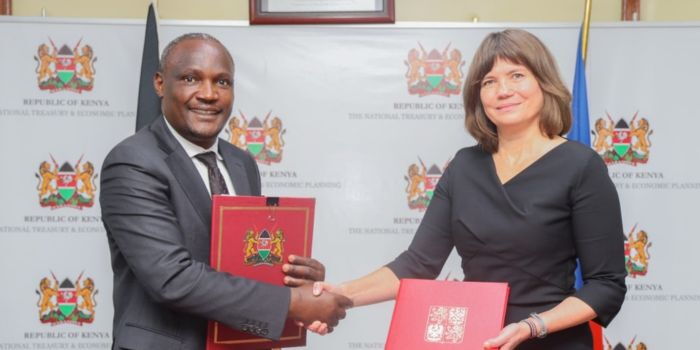Kenya has officially signed a Double Taxation Avoidance Agreement (DTAA) with the Czech Republic, a move expected to ease the tax burden for businesses and strengthen bilateral ties.
In a statement on Tuesday, September 23, the National Treasury confirmed that the agreement was signed by Treasury Cabinet Secretary (CS) John Mbadi and the Czech Republic’s Ambassador to Kenya, Nicol Adamcová. The signing ceremony, held at the Treasury Building in Nairobi, was attended by representatives from both countries, including officials from the Kenya Revenue Authority (KRA), the Ministry of Foreign and Diaspora Affairs, and the Office of the Attorney General.
Double taxation occurs when a company or individual is required to pay taxes on the same income in two jurisdictions. Before this agreement, a Kenyan business with operations in the Czech Republic faced tax obligations in both nations. With the DTAA in place, taxation will now depend on where the business has a permanent establishment. If a Kenyan company operates in the Czech Republic without a permanent office, Kenya will have sole taxing rights. However, if the company sets up a permanent office in the Czech Republic, then the Czech authorities will tax the profits earned there.
Speaking during the signing, CS Mbadi noted that the agreement is critical in curbing tax avoidance and evasion, often resulting from poor tax planning. He emphasized that the DTAA not only provides clarity and predictability for businesses but also reinforces the healthy diplomatic ties Kenya and the Czech Republic have enjoyed over the years.
“The agreement reflects the enduring strength of Kenya–Czech relations and constitutes an important milestone for the business community by offering clarity and predictability in the taxation of cross-border income,” the Treasury stated.
Kenya has now signed DTAA agreements with 16 countries, including Canada, France, Germany, India, South Africa, the United Kingdom, and the United Arab Emirates. The agreements are seen as essential tools to create a fair and competitive investment climate while avoiding unintended double taxation.

